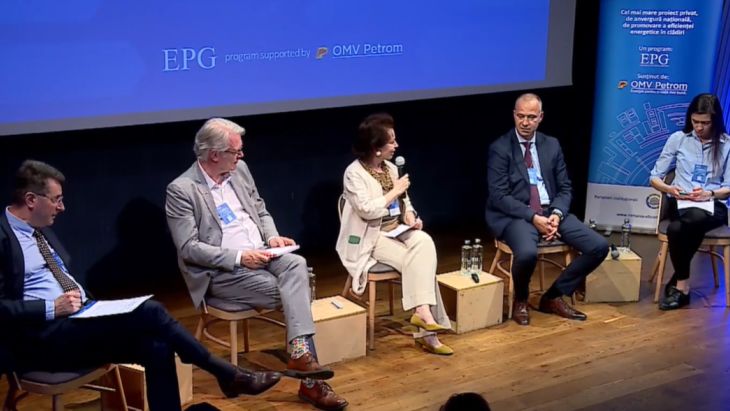Renovation rates in Romania are low and barely sufficient to meet the country’s and the EU’s energy savings and emission reduction targets in buildings. From this starting point on, five top level speakers animated the conversation in the “Country and EU level renovation challenges” panel at the 2024 România Eficientă Forum “EPBD Recast. Policy, challenges, and implementation”, organized by the Energy Policy Group think tank with the support of OMV Petrom.
The speakers explored options and strategies to strengthen the renovation sector through the operationalization of the EPBD recast, while ensuring that new measures are sidestepping potential and past pitfalls.
“It is not a government that should introduce a national Building Renovation Plan”, insisted Adrian Joyce is the Secretary General of EuroACE – Energy Efficient Buildings, and the Director of the Renovate Europe Campaign. He strongly believes that a cross party task force, with all political parties involved, should agree upon a long term plan. “If we don’t do something like that, which will be considered radical by most member states, then I don’t have much hope”, he said. In order that a national Building Renovation Plan survive national elections, one of the biggest problems over time all across Europe in every member state, “we have to start renovation schemes that are not subject to annual budget cycles.”.
In addition, he talked about “good monitoring of the results of the renovation projects so that the lessons learnt to be fed back into the next projects that come along”. Answering a question from Energynomics, he explained how this might work. “What we need is to have within every renovation scheme a portion of the funding dedicated to an assessment of the performance of the building before, then monitoring of the works underway. A lot of the underperformance we hear is that the work was not properly supervised. […] We know that if we don’t earmark a percentage of the available funding for such activities and contract them to be undertaken by an agency or a consulting firm, then we will not get this virtuous feedback loop”, said Adrian Joyce.
Valérie Plainemaison, General Secretary, European Federation of Intelligent Energy Efficiency Services EFIEES, talked about the need of one-stop-shop for big buildings, and planning distinct approaches for categories of buildings, and also for different districts based on their characteristics. She also warned that, “cooling is the next challenge”, after many years when heating took the main stage.
In this context, Radu Dudău, the executive director of EPG, touched on the topic of staged deep renovation, a concept referring to renovation works being undertaken in several steps, that improve the building’s performance progressively over time. “It is not just a matter of cases the owner doesn’t dispose of full funding for the deep renovation. It is also a matter of public policy to be open to parallel programs such as rolling out heat pumps. […] The prerequisite, of course, is the renovation passport,” he said.
Mihai Moia, Director of the Romanian Energy Efficiency Association, ROENEF reminded the fact that the institutional capacities of the Romanian authorities represent the biggest challenges to be overcome, especially their “capacity to enforce or to check the quality of the renovation works”. He use the opportunity to highlight the fact that “technologies are available now”, and there is “increased awareness on energy efficiency topics”.
Aura Oancea, a researcher in the Buildings Department, within EPG, presented Our-CEE project for overcoming underperforming renovations in CEE.
The meeting was put together by EPG as part of the Romania Eficientă Programme, a privately funded multiannual project that works to make buildings more energy efficient by doing things like public awareness campaigns, training programmes, and repairs on public schools all over the country. OMV Petrom helps fund the România Eficientă Programme.
